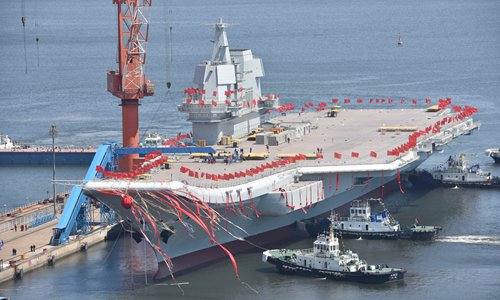
Ma Weiming Photo: Screenshot of CCTV
As the winner of the People's Liberation Army's top military award in 2017, Rear Admiral Ma Weiming is a familiar name to Chinese.
The specialist in electrical engineering is the inventor of the electromagnetic catapult that some media said China might use aboard its latest aircraft carrier to launch and land fighter jets.
Ma and his team have done repeated successful tests on the catapult-assisted take-off technology. Ma says the technology is just as good as the system the Americans use, China Military Online reported.
In a documentary filmed by China Central Television (CCTV), Ma said that his character is like his surname Ma - in Chinese, it means a horse - "stubborn and short-tempered."
Last year, his research team developed a medium-voltage, direct-current transmission network to replace the older alternating current system for the country's domestically built Type 002 carrier, which could provide more power for its electromagnetic aircraft launch system (EMALS).
Military expert Song Zhongping told the Global Times for a previous report that the intelligent power distribution of the system can support the use of high power-consuming weapons, such as electromagnetic guns, and solve the power shortage problems on older vessels.
Behind many great innovations is Ma's humble innovative spirit. "When I look back at my 30-year path of scientific research and innovation, I believe sticking to modesty and austerity can help overcome difficulty with great concentration, and lead to more achievements in technology, especially in our current society, driven by profit and temptation," Ma said in the documentary.

China's first domestically built aircraft carrier is transferred from dry dock into the water at a launch ceremony in Dalian in April 2017. Photo: VCG
Unexpected fate
Born in Yangzhong, Jiangsu Province, in April 1960, Ma had never thought of studying in a military school because of his free and easy character. However, he chose "no preference" when filling out the application form on his college entrance exam, and therefore had to obey when he was assigned to a military school.
"To tell you the truth, I didn't want to go to military school at the beginning," he told CCTV.
But he realized if something could be changed on his own, he would try to make a change; if it couldn't be changed, he would get used to it, and remold it gradually.
After graduating from the Department of Electrical Engineering of the Naval University of Engineering (NUE) in 1982, he became a teacher at a military school in northern China. Ma was not satisfied with his daily work of training and handling trivial matters since he thought they hindered him from devoting himself to research.
His talent was found by his supervisor, an influential person for Ma's whole life, Zhang Gaifan, who transferred Ma to the Naval University of Engineering so that he could further his studies and continue his research.
"Stubborn"expert
In the early 1990s, engineers in China were developing a conventional submarine and had to import a high-performance 12-phase generator-rectifier system from abroad.
During a technical negotiation with foreign merchants, Ma raised the problem that the system had natural oscillation. However, the foreign merchant brushed the issue to one side, denying that their product had any problem.
In order to prove the existence of the problem, Ma spent 1,800 days and nights on measuring, recording and analyzing the issue. The experimental notes and reports filled up half his office.
After analyzing tens of thousands of sets of data, Ma successfully developed a multi-phase generator-rectifier system with stabilizing windings that could solve the problem of natural oscillation. The foreign merchant who denied the problem then had to come to buy Ma's patent. His patent won first place in the State Scientific and Technological Progress Awards.
He became an academician of Chinese Academy of Engineering in 2001 when he was 41, much younger than the average age of people with that honor.
Strong team
The team led by Ma has been recognized and awarded frequently in recent years. The team spent eight years developing the first double winding AC-DC generator system in the world in 2002, a core Chinese-developed technology with proprietary intellectual property rights.
A year later, the team created and successfully developed a medium voltage DC integrated power system, which was ahead of foreign technology by 10 years.
However, as Ma gained the confidence to tackle bigger technical difficulties, his supervisor Zhang passed away. "From then on, there was no one I could talk to if I had new ideas or questions. Even though I led the team since 1991, I counted on him sometimes," Ma told CCTV.
Inspired by Zhang's spirit of innovation, Ma set up a scholarship for hardworking but poor students, using the money awarded by The Ho Leung Ho Lee Foundation, which amounted to $127,000.
Cultivating talent and improving the team are the priorities for Ma at present. He tries to give every team member opportunities to develop their own research.
Meng Jin, researcher at the Power Electronic Technique Application Research Institute of the NUE, said the quality of a team is not reflected by the number of researchers, but by the composition of the staff and the solidarity of the team.
Ma is glad to see a group of talented young people standing out in his team, which has an average age of 35 years old. "I hope my students can all surpass me and don't let me down," he said.
Holding a spirit of never giving up, he thinks challenges make life interesting.

